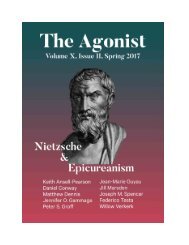Volume XII, Issue II, Spring 2019
Create successful ePaper yourself
Turn your PDF publications into a flip-book with our unique Google optimized e-Paper software.
MICHAEL STEINMANN<br />
fails because the overcoming of all goals and representations, which in itself<br />
would be a-temporal (everything returns and therefore everything always stays the<br />
same), can only be pictured through the succession of time. The idea also refutes<br />
itself, because if everything comes back, then one cannot know it, otherwise a<br />
different state would come back every time (293). Stegmaier’s emphasis on the<br />
paradoxical meaning of Nietzsche’s ideas is opposed to more systematizing<br />
approaches. In contrast to Günter Abel, for example, Stegmaier avoids the<br />
abstract terminology of Nietzsche’s late notebooks and relies on the more literary<br />
published works. As he urges the reader to consider the individual experience of<br />
becoming, he also urges her to consider the individual contexts in which such<br />
experiences are expressed. Renouncing the temptation to extract another<br />
formalistic ‘theory’ from Nietzsche’s works is a major contribution of his study.<br />
Zarathustra shows that perspectivism is closely linked to the temporalization<br />
of philosophy. For Stegmaier, temporalization does not mean that philosophy<br />
thinks about time but that it considers the inherent temporality of thoughts and<br />
ideas (94). For Nietzsche, time is as fundamental as it is for Heidegger, Stegmaier<br />
claims (121). The inherent temporality of thoughts can be captured in tropes like<br />
the noon. Tropes like this entail “no calculating of what always stays the same,<br />
repeats itself regularly, or is finally completed, but the acceptance of incalculable<br />
things, life with surprising things, the affirmation of right times and times that<br />
may not be right, including situations in which things appear ‘at a bad time’” (102-<br />
3). This way, time has its own measure of what is appropriate for human life. The<br />
idea of an event occurring at the “right time,” for example, refers to “the<br />
incommensurable time of individuals and their worlds” (120). This means, again,<br />
that genuine individuality cannot be captured through yet another general notion<br />
but depends on an uncontrollable temporal experience. In the English-speaking<br />
literature, one can only think of Nehamas as a Nietzsche scholar who has taken<br />
the problem of individuality seriously to the same degree.<br />
Stegmaier has also done important work on Nietzsche’s relation to<br />
Darwinism. There, he looks past Nietzsche’s own polemic. His detailed<br />
interpretation shows that Nietzsche is eventually more in line with Darwin than<br />
he himself assumed (136). Insofar as evolution entails only a probabilistic account<br />
of causality, it understands life based on individual processes. Nietzsche conceives<br />
of the will to power as embedded in deeply individual processes, which “like the<br />
selective processes of evolutionary biology follow only their own necessity, which<br />
in turn results from the respective circumstances and cannot be captured in<br />
general terms” (151). For Stegmaier, this understanding of biological life is “the<br />
final thought of Darwin’s theory of evolution” of which “Nietzsche’s philosophy<br />
is the deepest interpretation” (ibid.). Darwin gave up the idea of fixed species,<br />
67









